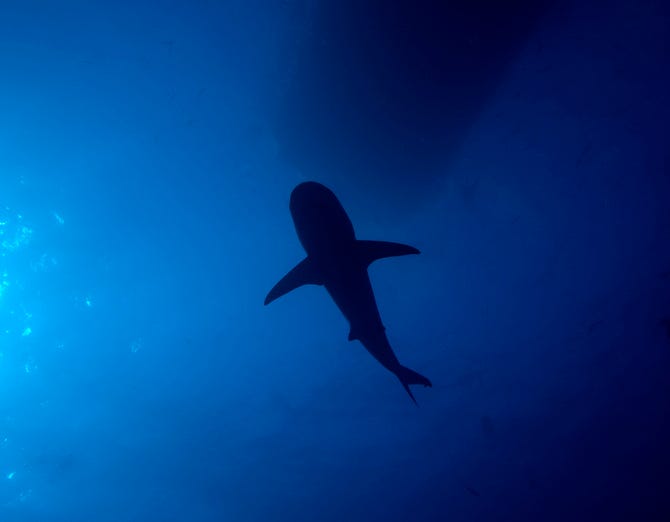
A Connecticut couple scuba diving off the coast of Rhode Island on Monday came upon a sea creature they'd never seen before: something that appeared to have the body of a shark, but a hand for a head.
However, upon closer examination, Deb and Steve Dauphinais realized they were looking at a baby shark that had gotten its head hopelessly stuck in a work glove.
Deb, who has been a scuba instructor for about 30 years, told the Associated Press she initially thought the shark was dead, until it twitched.
Feeling sorry for the 16-inch predator, which appeared to be a juvenile Dogfish shark, Steve swam over and tried to remove the glove, which took a few minutes before it came loose.
"It kind of looked at both of us, didn't look at all injured, got its equilibrium back and then swam off back to where it is supposed to be," Deb told the AP.
She and her husband were cautious in case the shark snapped at them, but Deb said they were never fearful -- they just wanted to help.
"There are countless stories of underwater sea creatures being killed by underwater sea trash," Deb said, adding that she once saved a sea bass that was hooked on discarded fishing line. "It's an ongoing issue that's near and dear to my heart. But these are the only times I've been able to save something, at least a shark, like that."
While sea trash includes derelict fishing gear and abandoned vessels, about 90 percent of the trash found in the ocean is plastic. According to National Geographic, there are 5.25 trillion pieces of plastic debris in the ocean.
An estimated 33 billion pounds of plastic enter the marine environment from land-based sources every year — roughly the equivalent of dumping two garbage trucks full of plastic into the ocean every minute, according to advocacy group Oceana.
Once in the ocean, plastic waste is nearly impossible to retrieve. As it breaks down, harmful microplastics are released into the water, posing a risk to the environment and animals. Some plastic takes as long as 400 years to break down due to additives that make products stronger and more durable, according to National Geographic.
The National Oceanic and Atmospheric Administration says hundreds of marine species worldwide have been negatively impacted by marine debris, which can harm or kill an animal when it is ingested or they become entangled, and can threaten the habitats they depend on.
Conservationists agree the solution to marine pollution is to prevent the waste from entering waterways in the first place, with recycling systems, the plastic industry and product manufacturers working together to accomplish the goal.
Listen and subscribe to The L.A. Local podcast: your TL;DR for what's happening in Southern California
Follow KNX News 97.1 FM
Twitter | Facebook | Instagram | TikTok
